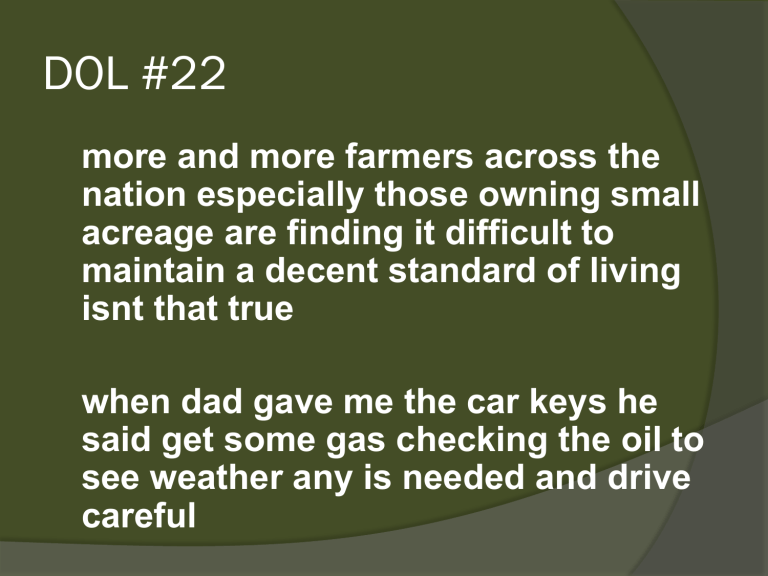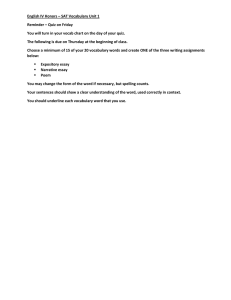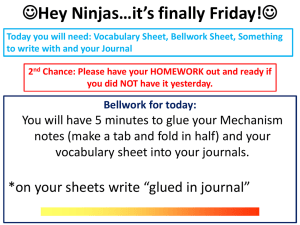AP Language and Composition: A Block 3/3/14

DOL #22
more and more farmers across the nation especially those owning small acreage are finding it difficult to maintain a decent standard of living isnt that true when dad gave me the car keys he said get some gas checking the oil to see weather any is needed and drive careful
AP Language and Composition:
A Block 3/6/14
Vocab quiz
Go to T101 for guidance presentation
AP Language and Composition:
A Block 3/7/14
DOL #23
The plan for now until the test.
Present symbols poster & take notes
Determine central argument of each critical essay and discuss
Homework:
Read pgs. 48-81 in Everyday Use . Be ready to apply ideas on Tuesday. Quiz on reading on
Thursday. You can use one large index card.
Vocab 12 quiz Tuesday.
Vocab 13 quiz Monday, 3/17
DOL #23
after several attempts in class darnell was able to liquefy the granules bringing it to a boil and separated the components consuela and erica have got to meet ms johnston at 300 pm so that she can learn their new cheerleaders routine
AP Language and Composition:
A Block 3/11/14
Objective: Students will understand the meaning of five symbols in The Great Gatsby and will identify the central argument and supporting details in five critical essays.
DOL #24
Vocab 12 quiz
Present symbols posters & take notes
Finish discussing critical essays
Homework:
Everyday Use quiz Thursday
Vocab 13 quiz Monday
AP Language and Composition:
A Block 3/12/14
Objective: Students will know how to do a “what/how analysis” by practicing with passages from The Great Gatsby.
DOL #25
Finish discussing critical essays
Close reading using “what/how analysis”
What does the author say?
What is the author’s purpose?
How does the author achieve that purpose?
Homework:
Everyday Use quiz tomorrow
Vocab 13 quiz Monday
AP Language and Composition:
A Block 3/13/14
Everyday Use quiz
Gatsby synthesis essay
“I Can’t Even” article
Homework:
Vocab quiz and what/how passage analysis due
Monday
Vocab quiz 14 Thursday, March 20 th
Gatsby paper due Thursday, March 27 th at 5:00 P.M. to turnitin.com
Read Declaration of Independence and Declaration of
Sentiments and Resolutions, identify syllogism / enthymeme by Monday
Synthesis Essay
The thesis should be your original idea. It should say something about the text that isn’t immediately apparent.
Each paragraph should begin (statement) and end (analysis) with your own idea. Use the articles and text to back up your argument about the text (proof). You can quote directly or paraphrase, but remember to cite an idea that you get from the scholars even if you don’t quote it.
Make sure the paper and the Works Cited are properly formatted according to MLA style.
AP Language and Composition:
A Block 3/17/14
Objective: to identify and compare syllogisms and rhetorical devices in the
Declaration of Independence and the Declaration of Sentiments and Resolutions
DOL #26
Vocab 13 quiz
Hand in paragraphs
Identify the major premise, minor premise, and conclusions in both Declarations
Discuss how Jefferson and Stanton achieve their purposes.
Homework:
Gatsby paper due Thursday, March 27 th at 5:00 P.M. to turnitin.com
Read Of Cannibals for tomorrow
Read Uncle Tom’s Cabin for Thursday
Read “Common Sense” for Friday
Declarations of Independence due Friday @ 5PM to turnitin
AP Language and Composition:
A Block 3/18/14
Objective: To generalize our discussion of the declarations into a partial framework for rhetorical analysis, apply that framework to another text, and learn how to do a “says / does” analysis.
DOL #27
Discuss papers
Hand in what/how analyses (from yesterday —oops!)
Finish discussion of declarations
Meta-analysis: what did we discuss?
Discuss Of Cannibals : “Says/Does” Analysis
Homework
Gatsby paper due Thursday, March 27 th
Read Uncle Tom’s Cabin for Thursday
Read “Common Sense” for Friday at 5:00 P.M. to turnitin.com
Declarations of Independence due Friday @ 5PM to turnitin
Letter reflections due Monday, 3/24 (paper copy)
Jump-starting a says/does analysis for Of
Cannibals (paragraph-by-paragraph)
What does the paragraph say?
1. American Indians are not savage;
Europeans only think they’re savage because they’re unfamiliar to
Europeans. What we think of “savage” is actually closer to nature, uncorrupted by civilization. There’s no reason to think that the ability to alter nature is superior to living in nature without changing it. Europeans are actually
“savage” because we’ve altered things that nature made perfect to fit our
“corrupted taste.” Nevertheless, nature is superior to technology and art.
What does the paragraph do?
Montaigne introduces his argument by countering the European definition of
“wild” and arguing for a redefinition of the term “savage.” He develops a contrast between art (technology or any alteration of nature) and Nature, personifying nature with reverent diction
(“beauty,” “riches,” “purity”) and using violent diction to characterize the actions of Europeans toward nature
(“surcharged” and “overchoked”). He emphasizes the inherent superiority of nature by dismissing all human enterprise to change it, using diction that belittles and undermines those to seek to alter nature, like “vain,”
“frivolous,” and ashamed.”
AP Language and Composition:
A Block 3/20/14
Objective: To continue practicing different approaches to rhetorical analysis
DOL #28
Vocab 14 Quiz (10 minutes)
Finish Of Cannibals “says / does” analysis and discuss
Good examples of Gatsby what / how analyses
Analyze Uncle Tom’s Cabin in groups, then together.
Homework
Gatsby paper due Thursday, March 27 th at 5:00 P.M. to turnitin.com
Read “Common Sense” for Friday
Declarations of Independence due Friday @ 5PM to turnitin
Letter reflections due Monday, 3/24 (paper copy)
Read “The Devil and Tom Walker” for Wednesday, 3/26



